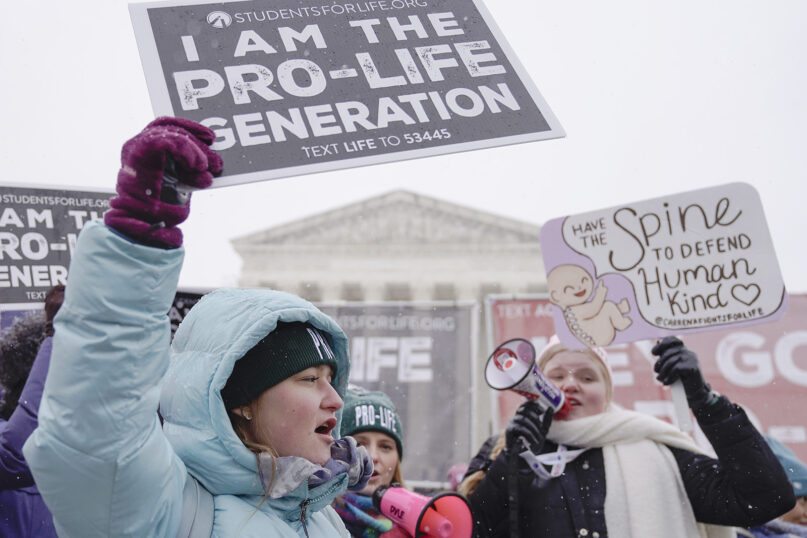(RNS) — I often come across people who insist they are genuinely pro-choice, but “not pro-abortion,” they emphasize, as if pro-lifers who use that term about some pro-choice advocates are somehow disingenuous.
While pro-lifers ought to use precise language whenever they talk about abortion, there are good reasons to use the term “pro-abortion” in some circumstances — for instance, when people say abortion is like any other kind of health care, or insist that talk about it being “rare” is problematic because it stigmatizes abortion as undesirable. One does not need to be a card-carrying member of the “Shout Your Abortion” movement (dedicated to “normalizing your abortion”) to be considered pro-abortion.
Indeed, it is an increasingly common view that abortion is necessary for women to flourish in today’s society. Vice President Kamala Harris recently suggested that young women should consider the availability of abortion before they decide where to attend college.
Harris would be on solid ground if she were to focus on the fact that higher education discriminates against pregnant women, particularly if they are undergraduates. More ought to be done, including on Catholic and other religiously affiliated campuses, to welcome pregnant students.
In response to this situation, pro-life members of Congress have backed the Pregnant Students’ Rights Act, which attempts to change a hostile culture by giving young women a fighting chance to know their rights and sources of support if they choose to keep their baby. This is obvious common ground between pro-lifers and those who are genuinely pro-choice, but not a single Democrat in the House voted for the bill.
College students aren’t the only ones being structurally coerced into abortion. Despite lower-income women being more anti-abortion, such women have the overwhelming majority of abortions in the U.S. Every year, tens of thousands of abortions take place that women don’t want. A May 2023 study showed that 7 in 10 women, looking back on their abortions, describe their procedures as “accepted but inconsistent with their values and preferences” (43%) or “unwanted or coerced” (24%).
Our concern ought not to be with just data points, but real women with real pain. The group Secular Pro-Life has done great work compiling quotes from the Shout Your Abortion’s website articulating some of this pain — pain that often comes with the clearly articulated hope that the child they wanted would come back or return at some point when the mother was in a different situation.
Very often there is explicit or implied coercion coming from the male partner. A classic story of this emerged last fall, when Britney Spears, in her memoir, detailed the emotional pain of undergoing an abortion at age 19, pain that is still clearly present for her. “If it were up to me alone, I never would have done it,” said Spears. “And yet Justin [Timberlake] was so sure he didn’t want to be a father.” (Timberlake has not publicly responded to Spears’ claims.)
Most cases of coercion do not make these kinds of headlines, but sometimes they do. In 2018, a doctor was sentenced to three years in prison after slipping an abortion pill into his pregnant ex-girlfriend’s drink. In 2013, an NBA player allegedly made a sexual partner sign a contract that she would have an abortion if she became pregnant. Last year, police accused a man in Florida of killing his pregnant girlfriend after she refused to have an abortion.
The correlation between intimate partner violence and abortion has been recognized for more than a decade, yet it has not received nearly the attention it should. It should shock but not surprise us that women who are pregnant are more likely to die by homicide than they are likely to die because of sepsis, high blood pressure or any other medical condition.
Pro-life leaders have told me in recent months that they are focusing on unwanted abortions, with plans to try to hold abortion providers and others who care for pregnant women accountable for not screening for intimate partner violence and other kinds of coercion.
Many of these leaders are also looking at other ways to support women to have a true choice. Hundreds of pro-life activists publicly signed a document emphasizing our support for accessible and affordable health care, expanded child tax credits, paid parental leave, flexible work hours, affordable child care and prenatal child support laws.
The movement is especially advanced in pro-life states, where Catholic bishop conferences and individual dioceses are explicitly working toward these goals, often in partnership with the social-justice focused arms of the church, such as Catholic Charities.
If you identify as pro-choice, resist the label pro-abortion and sincerely want to reduce the number of unwanted and coerced abortions, the opportunities to do so are increasingly abundant, and bipartisan.






